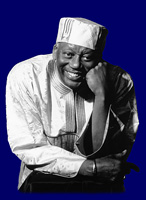|
|
Randy Weston's latest
recordings:
|
|
Sound
Solo piano (2018)
|
 |
|
|
The
African Nubian Suite
An epic storytelling told in many voices, many registers, many dimensions.
|
 |
|
|
The
Roots of the Blues
Randy Weston and Billy Harper's long partnership has culminated in their first duo recording.
(JJA Jazz Award - Duo of the year 2014)
|
 |
|
|
|
The
Storyteller
Weston's first recording with the whole African Rhythms ensemble since
2002. Recorded live at Jazz at Lincoln Center's Dizzy's Club Coca-Cola, the set features drummer Lewis Nash with members of Weston's regular quintet: trombonist Benny Powell; alto saxophonist
TK Blue; bassist
Alex Blake; and percussionist
Neil Clarke.
|
 |
|
|
|
Zep Tepi
His first trio album in many years. The 10 songs on this album reflect the
arc of his musical journey from: old favorites to new works
|
 |
|
|
|
Randy Weston Live in St. Lucia
Live registration of the
Randy Weston African Rhythms Quintet.
|
 |
|
|
|
Ancient Future
2 CD's solo piano recording that combines 16 solo
piano recordings with 7 solo piano recording from 1984 that was released
as
Blue on 1750 Arch Records produced by Thomas Buckner.
Ancient Future is a meditation on music's origins.
"I thought about Osiris," Weston recalled, "when he was assigned to teach
man about civilization and he used music to do it."
Spare, contemplative,"
Ancient Future " is evocative of William Grant Still's "Africa
(A Poem
for Orchestra in Three Movements - 1928)".
The 1990's witnessed a string of recordings on Verve Records
that exhibit
Randy Weston’s pioneering musical aspiration.
|
 |
|
|
|
SPIRIT! The power of music
1999, Randy Weston African Rhythms Quintet
and the master Gnawa musicians of Morocco was released. "What
was so wonderful was that we had these three religions, Christianity,
Islam and Yoruba, in music and the church was just packed with people. It
was so spiritual, all this wonderful music together. So it was quite,
quite the evening, one I’ll never forget.”
|
 |
|
|
|
Khepera
1998, Randy makes the
connection between African and Chinese music.
|
 |
|
|
|
Earth Birth
1997, featuring Randy Weston with The
Montreal String Orchestra.
|
 |
|
|
|
Saga
1996,saw the release of the critically acclaimed recording.
|
 |
|
|
|
Volcano Blues
1993, Randy Weston teams up with long-time
collaborator
Melba Liston and criss-crosses the Atlantic chronicling the
originations and destinations of the genre of African-American Music.
|
 |
|
|
|
The Splendid Master Gnawa musicians of Morocco
Recorded in 1992,
Never in the history of Moroccan culture have their ever been nine
hag'houges (gembris, guinbres) together with two percussionists. Each master
sang his own song; after each one finished another continued. It was
a historic moment.
Randy
Weston's musical odyssey is another installment in an already amazing body
of work.
|
 |
|
|
Spirits of our Ancestors
In 1991, he told the story of the roots of the blues.
The the 2CD set
was hailed for its concept as well as its musicianship.
Robert Palmer wrote in Rolling Stone, "SPIRITS! is the kind of 'jazz'
record that, like Miles' KIND OF BLUE, connects with anyone who hears it.
Listen up". |
 |
|
|
|
Randy Weston African Rhythms Discography >> |
|
|
|
Randy Weston, born in Brooklyn, New York
in 1926,
didn't have to travel far to hear the early jazz giants that were
to influence him.
Though Weston cites Count Basie, Nat King Cole,
Art
Tatum,
and of course, Duke Ellington as his other piano heroes,
it was
Monk who had the greatest impact.
"He was the most original I ever
heard," Weston remembers.
"He played like they
must have played in Egypt 5000 years ago."
Randy Weston’s first recording as a leader
came in 1954 on Riverside
Records
Randy
Weston plays Cole Porter - Cole Porter in a modern mood
It was in the 50's when Randy Weston played around New York
with Cecil
Payne and Kenny Dorham that he wrote many of his
best loved tunes, "Saucer
Eyes," "Pam's Waltz," "Little Niles,"
and
his greatest hit, "Hi-Fly".
Weston (who is 6' 8") says, is a "tale
of being my height
and looking down at the ground. |
|

Photo
by Ariane Smolderen
|
|
|
Randy Weston has never failed to make the connections between
African
and American music.
His dedication is due in large part to his father,
Frank Edward Weston,
who told his son that he was, "an African born in
America."
"He told me I had to learn about myself and about him and
about my grandparents," Weston said in an interview, "
and the only way
to do it was I'd have to go back to the motherland one day."
In the late 60's, Weston left the country.
But instead of moving
to Europe like so many of his contemporaries,
Weston went to Africa.
Though he settled in Morocco, he traveled throughout the continent
tasting the musical fruits of other nations.
One of his most
memorable experiences was the 1977 Nigerian festival,
which drew
artists from 60 cultures.
"At the end," Weston says,
"we all
realized that our music was different but the same,
because if you
take out the African elements of bossa nova, samba, jazz, blues, you
have nothing..........
To me, it's Mother Africa's way of surviving in
the new world."
|
|


